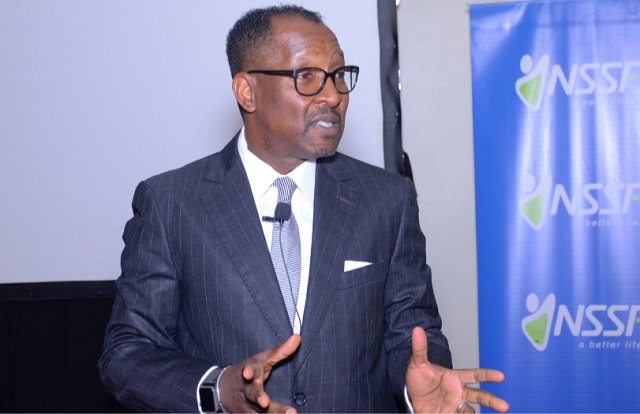
Majority of the Fund’s retirees are making wrong investment decisions
Kampala, Uganda | JULIUS BUSINGE | It is now evident that savers need advice on how to invest their long time savings as they transition to retirement, according to Richard Byarugaba, the managing director of the National Social Security Fund.
Byarugaba told business reporters on May 29 at the Kampala Serena Hotel that his view is based on a study conducted by the Fund at the end of last year.
The study aimed at finding out the quality of life of NSSF beneficiaries after receiving their benefits. Byarugaba said majority of the respondents did not have good investment decisions.
Byarugaba said the study that involved 402 respondents, showed 53% of the respondents are unable to sustain their saving for a year. 98% of the respondents had no cash left as at the end of first year.
He said building or improving homes was identified as the most expenditure line that NSSF beneficiaries planned to invest their benefits.
The study also showed that 15% of the beneficiaries started or expanded their business, 15% acquired land, 12% spent on self education or on dependents, 3% spend on crop farming or forestry, and 3% spent on animal husbandry/poultry.
Other respondents had spent their savings on medical expenses while others had acquired or improved on assets other than land.
This trend, Byarugaba said, is likely to stay the same for years to come.
In addition, he said some members get financial advice from family members and that a large number of retirees have either not planned or have a wrong plan for spending their savings.
Others [retirees] are not well prepared when it comes to spending their earned savings.
“We know the story would be different if they had planned well and had sought professional advice,” he said.
Possible solution
A section of respondents recommended that retirement package be given to retirees in installments, the study said.
NSSF also plans to carry out a comprehensive financial literacy programme to help prospective retirees plan better for their retirement.
The pension fund will hold the first investment and wealth management symposium dubbed ‘Money Talk’ in Kampala on June 10.
Byarugaba said similar events will be held regularly to not only build a financially aware and empowered membership but also give members other investment options through their life cycle.
These events will bring together financial advisory and investment experts from Uganda and beyond to stimulate professional financial and investment decision making. They will target new members and those who are about to exit the Fund.
“We hope that the financial literacy programme we have introduced will lead to better investment decisions so that upon retirement Ugandans do not end up being destitute,” Byarugaba said.
Investment experts agree that this new move will provide guidance to retirees and would impact the economy positively.
“I support the idea of giving retirees a lump sum but with full financial knowledge,” Joseph Kibuuka, the former head of investment banking at Crested Capital told The Independent on June 02.
On the contrary, he said paying retirees installments does not make sense to those that are ready with big plans to invest their money in ventures with high return.
“It is easy to misuse the money paid in installments than a lump sum,” he said.
Kibuuka said it is important for NSSF to impart knowledge and skills on how to better manage their savings.
He says investing in financial markets – government treasury bills and bonds, corporate bonds – that have a 12% or more return per year, and is risk free, makes more business sense than investing in rentals or building a house.
“NSSF needs to put their members in class before disbursing their savings [money] to them,” Kibuuka said.
He also said NSSF should explore the idea of serving as a guarantor to its members with intentions of borrowing from financial institutions using their savings as collateral.
Currently, NSSF has a total of 1.6million members (slightly over half of that number is active) and has an asset base of Shs10.6trillion as at end of May 2019.
****
 The Independent Uganda: You get the Truth we Pay the Price
The Independent Uganda: You get the Truth we Pay the Price




SOME SHOULD B PAID A FEW YEARS TO RETIREMENT SO THAT PLANNING, INVESTING STARTS WEN ONE IS STILL OF ACTIVE AGE LIKE 45.